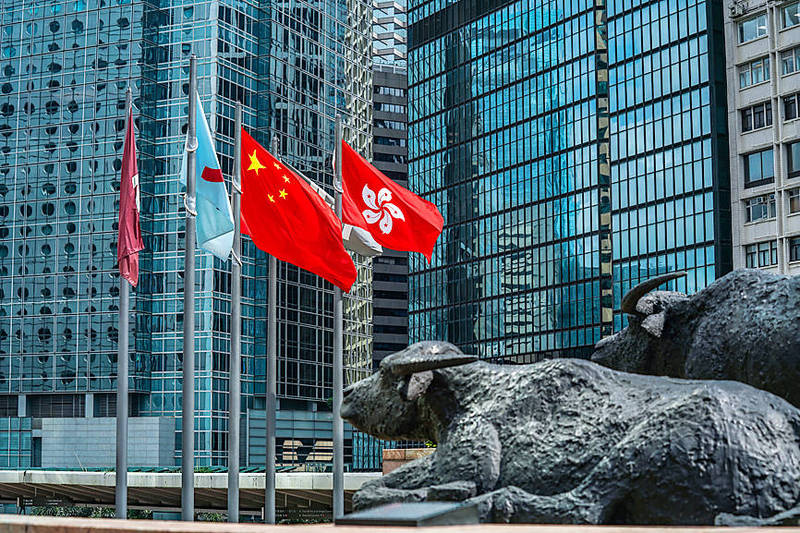The flag of the Hong Kong Special Administrative Region, right, flies alongside the flag of China outside the Hong Kong Stock Exchange on May 29, 2020. Photo: Bloomberg
POPULATION DECLINE: About 113,200 people have left Hong Kong in the past year as the UK has accepted 95% of 140,500 special visa applications since January last year
By Chen Yu-fu and Kayleigh Madjar / Staff reporter, with staff writer
The number of voters in Hong Kong has fallen for the first time in a decade, indicating a mass exodus as the territory's controversial National Security Law approaches its third anniversary, the Mainland Affairs Council said in a report.
According to the latest provisional voter roll released by the Hong Kong government, there were 4.42 million registered voters in the territory last year, the council said in a quarterly report to the legislation regarding Hong Kong, completed in October.
The figure is 54,000 fewer than last year's official voter registry, marking the first time in nearly a decade the voting population has declined, it said.
Only the oldest group of voters, aged 61 or above, grew in numbers, while those aged 18 to 20 dropped by 40 percent, it said.
The 35,800 newly registered voters also marked a 10-year low, it added.
The council attributed the decline in part to an exodus from the territory, as conditions worsened under the National Security Law and new hardline Hong Kong Chief Executive John Lee (李家超).
It also cited the deterioration of Hong Kong's electoral system, which has tempered willingness to register.
Population data from earlier this year showed 7,291,600 Hong Kong citizens, a decline of 1.6 percent, or about 121,500 people, from the same time last year, the report said.
It marked a third consecutive year of population decline and the lowest since 2016, it said.
It also estimated a net loss of 113,200 people to emigration in the past year.
The council cited a UN Human Rights Committee report in July that expressed concern about conditions in Hong Kong, fearing “overly broad interpretation of and arbitrary application” of the security law.
In particular, it questioned the lack of clarity on what constitutes a criminal offense under the law, and expressed concern over the transfer of cases to the Chinese government for prosecution and a deterioration of judicial impartiality.
The council also raised concerns about a decision by the Hong Kong Department of Justice to forgo juries in cases deemed to “involve foreign elements,” including the trials of democracy advocates and media entrepreneur Jimmy Lai.
The jury system is a foundational element of the territory's legal system guaranteed under the Basic Law, the council said.
The decision lacks reasonable grounds and deprives defenders of their right to a fair trial, raising fears that opaque state-directed legal procedures might become the norm, it said.
Applications for the British National (Overseas) visa, which grants approved Hong Kongers the right to live in the UK, totaled 140,500 during an 18-month period from January last year, the report said, citing British Home Office data.
Of those applications, 95 percent have been approved, it said, adding that the British government did not say why the remaining 5 percent were rejected.
In the second quarter of this year, there were 18,100 applications, about 1,400 fewer than in the first quarter, it said.
Analysts attribute the slight decline to COVID-19 controls in Hong Kong and rising consumer prices in the UK, although applications over a five-year period is expected to reach the UK's estimate of up to 320,000, it said.
Since the Taiwan-Hong Kong Exchange Services Office opened in 2020, it has fielded more than 2,500 phone calls and e-mails from Hong Kongers looking to emigrate to Taiwan, the council added.
News source: TAIPEI TIMES
